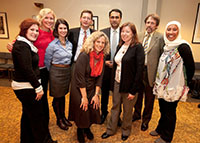

Vol 2, Issue 3 • June 2012
Sparking Interfaith Action
LISAR serves as catalyst for interfaith service and discussion
 Along with March flowers, an unseasonably warm spring also brought the completion of the President’s Interfaith and Community Service Campus Challenge. A yearlong effort to prompt interfaith and community service programming on more than 250 campuses across the country, the Challenge gave LISAR the opportunity to enhance the stature of interfaith work at UW-Madison. With LISAR coordinating the activities of nearly two dozen campus partners, the UW response featured more than twenty distinct projects, including interfaith teams trained by Institute staff for the Morgridge Center’s Badger Volunteers, multiple presentations by LISAR staff and students in the Multicultural Students Center’s “Race, Religion and Representation” Symposium, and “Savory Sunday,” an event the Undergraduate Fellows initiated at the State Capitol to feed the homeless.
Along with March flowers, an unseasonably warm spring also brought the completion of the President’s Interfaith and Community Service Campus Challenge. A yearlong effort to prompt interfaith and community service programming on more than 250 campuses across the country, the Challenge gave LISAR the opportunity to enhance the stature of interfaith work at UW-Madison. With LISAR coordinating the activities of nearly two dozen campus partners, the UW response featured more than twenty distinct projects, including interfaith teams trained by Institute staff for the Morgridge Center’s Badger Volunteers, multiple presentations by LISAR staff and students in the Multicultural Students Center’s “Race, Religion and Representation” Symposium, and “Savory Sunday,” an event the Undergraduate Fellows initiated at the State Capitol to feed the homeless.
To climax the year, LISAR invited Eboo Patel, President of the Interfaith Youth Core and the Challenge’s mastermind, to campus. Hundreds of people, including a delegation from UW-Eau Claire, packed Tripp Commons to hear “Acts of Faith: Interfaith Leadership in a Time of Global Religious Crisis.” Steven Olikara, Senior Class President, worked with Institute Director Charles Cohen to organize Patel’s visit. Observing that “The younger generation wants to make a difference in their careers, and interfaith is central to that,” Olikara expects that the speech will spark greater discussion of religion’s place at UW-Madison. The staff of LISAR heartily concur. We believe—have long believed—that increased campus attention to the role religion plays in the lives of students will benefit the entire UW-Madison community. The Institute has committed itself to increasing the collaborative interfaith efforts started this year during the Challenge [see “From the Director” in this issue]. Meanwhile, we take pride in having pushed interfaith activities at UW-Madison farther than they have ever gone before.
 Eboo Patel, charismatic founder of the Interfaith Youth Core and the genius behind the 2011-12 White House Interfaith and Community Service Campus Challenge, spent April 30 at UW-Madison preaching the importance of making interfaith cooperation a staple of college life. He held two small-group conversations with students and spoke to an audience of some two hundred fifty, but his most important presentation came at a dinner attended by most of the senior members of the UW administration, including Provost Paul DeLuca, Vice-Provost Damon Williams, Dean of Students Lori Berquam, and Dean of Letters & Science Gary Sandefur. UW is particularly well positioned to encourage interfaith efforts, he observed, because of its academic eminence, commitment to the Wisconsin Idea, and the presence of the Lubar Institute, which he deemed a singular resource: an academically-focused center for interfaith research and civic outreach unique at an American public university.
Eboo Patel, charismatic founder of the Interfaith Youth Core and the genius behind the 2011-12 White House Interfaith and Community Service Campus Challenge, spent April 30 at UW-Madison preaching the importance of making interfaith cooperation a staple of college life. He held two small-group conversations with students and spoke to an audience of some two hundred fifty, but his most important presentation came at a dinner attended by most of the senior members of the UW administration, including Provost Paul DeLuca, Vice-Provost Damon Williams, Dean of Students Lori Berquam, and Dean of Letters & Science Gary Sandefur. UW is particularly well positioned to encourage interfaith efforts, he observed, because of its academic eminence, commitment to the Wisconsin Idea, and the presence of the Lubar Institute, which he deemed a singular resource: an academically-focused center for interfaith research and civic outreach unique at an American public university.
That the senior campus leadership attended carefully to Patel’s remarks is significant because religion has historically been under-represented both academically and institutionally at UW. The Religious Studies Program now provides excellent intellectual direction for the dozens of majors and thousands of enrollees it serves each year (though the faculty’s numbers need substantial bolstering), but the University lags behind peer institutions in recognizing how extensively religious affiliation informs students’ identities and integrating religious difference into its diversity programming with the same care that it accords such categories as race, class, ethnicity, gender, and sexual orientation. UW’s multifaceted response to the White House Challenge, which LISAR spearheaded, has mobilized students to learn about each other’s faith traditions in a variety of venues: classes, service-learning projects, symposia, artistic performances, and voluntary gatherings. For 2012-13, the LISAR staff have made working with the administration to support and validate such engagements one of our highest priorities.
![]()
LISAR
Fellows
Voice
Jaimee Goldish, LUBAR Institute Fellow, 2011-2012
 I cannot begin to explain how much I have grown from my experience as a Lubar Institute fellow. I have met people from faiths different than my own, from which I have formed true and long-lasting friendships.
I cannot begin to explain how much I have grown from my experience as a Lubar Institute fellow. I have met people from faiths different than my own, from which I have formed true and long-lasting friendships.
When I first heard about the Lubar Institute’s fellows program, I was a little apprehensive about applying. I am a graduating senior, and I was afraid of having too many time commitments. Once the school year began, my involvement with LISAR became a privilege rather than a duty. I looked forward to our discussions on religion. The Lubar Institute helped me form relationships that I otherwise would not have sought out.
When I venture out into the real world after graduation, I will take with me the values I have learned from LISAR. I will no longer feel at a distance with those from different traditions. I have learned so much about religion and culture from the monthly undergraduate forums, and this knowledge will help me to be open to new people and experiences.
In terms of interfaith dialogue, I will miss the exploration of religious life for Muslims and Christians. In order to maintain a relationship with those from different faiths, I am going to bring the fundamental aspects of the Lubar Institute to my home community in Minneapolis. I will start at the local level within my own Jewish community to find a committed network of Jews devoted to interfaith relations. With them, we will invite members of Muslim and Christian community to join us in monthly discussions on what it means to live in a country with religious pluralism. My work with interfaith dialogue has just begun, and I have the Lubar Institute to thank for the start of this pathway.
![]()
LISAR's Rohany Nayan receives UW-Madison's 2012 Outstanding Women of Color Award
Lubar graduate fellow Rohany Nayan was among four UW-Madison women to receive the UW-Madison’s 2012 Outstanding Women of Color Award. This award recognizes members of the campus and greater Madison community who have made outstanding contributions in areas such as social justice, research, teaching and community-building for inclusive and respectful environments. Rohany’s many contributions to the campus and city include her recent coordination of the Lubar Institute’s Courage Project, an interfaith activity involving Jewish, Christian and Muslim high school students. The project gave them the opportunity to learn about each other’s beliefs and practices as well as to reflect more deeply on their own traditions. Please join us in congratulating Rohany for this honor and celebrating her inspiring work.
![]()
Mel Charbonneau joins the LISAR team
LISAR is excited to announce the hiring of Mel Charbonneau as our new communications specialist. Mel will work to broaden awareness of the Institute locally and nationally. Her appointment marks a new phase in the Institute’s efforts to increase its visibility. Mel brings more than eight years of communications, marketing and fundraising experience to the position.
Most recently, she served as the first Director of Communications and Marketing at the Center for Investigating Healthy Minds at UW-Madison. She managed the Center’s grand opening celebration, which featured His Holiness the 14th Dalai Lama. She also oversaw the production of various print and creative projects, press releases and website content as well as launching the Center’s social media and email marketing platforms. Mel was largely responsible for building its brand identity, improving its media relations efforts, and creating an integrated approach to inform the public about its mission and research. She will address the same tasks at LISAR.
![]()
 School may be out for summer, but the Lubar Institute is already gearing up for a busy fall.
School may be out for summer, but the Lubar Institute is already gearing up for a busy fall.
Your contributions offer the opportunity to support an unparalled effort: bringing together Muslim, Jewish and Christian students, faculty and community members to share ideas, learn about other faiths and increase understanding of their own. All gifts – regardless of size – enable LISAR to move forward both our academic and civic missions. We encourage you to visit our website to learn more about how your support can make a difference.
The campaign for LISAR, like the Institute itself, is unique; it could happen only at a public institution with a long tradition of civic involvement like UW- Madison.
Consider becoming a part of our work. You can make a gift online, or for assistance in making a gift by mail, or to discuss further giving opportunities, please contact our UW Foundation representative.
You can make a gift online, or
for assistance in making a gift by mail, or to discuss
further giving opportunities, please contact our UW
Foundation representative:
Stephen Wald, Director of Development
College of Letters and Science
University of Wisconsin Foundation
608-263-2202 (office) 608-287-6480 (cell)
stephen.wald@supportuw.org
